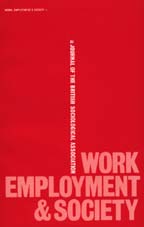Crossref Citations
This article has been cited by the following publications. This list is generated based on data provided by
Crossref.
Nichols, Theo
2001.
The condition of labour—a retrospect.
Capital & Class,
Vol. 25,
Issue. 3,
p.
185.
Gibb, Allan
2002.
Creating Conducive Environments for Learning and Entrepreneurship.
Industry and Higher Education,
Vol. 16,
Issue. 3,
p.
135.
Ogbonna, Emmanuel
and
Wilkinson, Barry
2003.
The False Promise of Organizational Culture Change: A Case Study of Middle Managers in Grocery Retailing*.
Journal of Management Studies,
Vol. 40,
Issue. 5,
p.
1151.
Hislop, Donald
2003.
Linking human resource management and knowledge management via commitment.
Employee Relations,
Vol. 25,
Issue. 2,
p.
182.
Worrall, Les
and
Cooper, Cary
2004.
Managers, hierarchies and perceptions: a study of UK managers.
Journal of Managerial Psychology,
Vol. 19,
Issue. 1,
p.
41.
Bamford, David
and
Daniel, Stephen
2005.
A case study of change management effectiveness within the NHS.
Journal of Change Management,
Vol. 5,
Issue. 4,
p.
391.
Thompson, Paul
2005.
Foundation and Empire: A critique of Hardt and Negri.
Capital & Class,
Vol. 29,
Issue. 2,
p.
73.
Collins, Grainne
2005.
The Gendered Nature of Mergers.
Gender, Work & Organization,
Vol. 12,
Issue. 3,
p.
270.
Cooper, Cary
and
Worrall, Les
2008.
The Routledge Companion to Strategic Human Resource Management.
p.
488.
McCann, Leo
Morris, Jonathan
and
Hassard, John
2008.
Normalized Intensity: The New Labour Process of Middle Management.
Journal of Management Studies,
Vol. 45,
Issue. 2,
p.
343.
Agarwal, Ritu
Angst, Corey M.
and
Magni, Massimo
2009.
The performance effects of coaching: a multilevel analysis using hierarchical linear modeling.
The International Journal of Human Resource Management,
Vol. 20,
Issue. 10,
p.
2110.
Yang, Song
2009.
STILL FEELING PROUD TO BE WORKING FOR YOUR EMPLOYER? LONGITUDINAL CHANGES IN WHITE COLLAR EMPLOYEES' MORALE IN A TIME OF ORGANIZATIONAL RESTRUCTURING.
Sociological Spectrum,
Vol. 29,
Issue. 5,
p.
572.
Johns, Gary
2010.
Presenteeism in the workplace: A review and research agenda.
Journal of Organizational Behavior,
Vol. 31,
Issue. 4,
p.
519.
Bolduc, François
and
Baril-Gingras, Geneviève
2010.
Les conditions d’exercice du travail des cadres de premier niveau : une étude de cas.
Perspectives interdisciplinaires sur le travail et la santé,
McCann, Leo
Hassard, John
and
Morris, Jonathan
2010.
Restructuring Managerial Labour in the USA, the UK and Japan: Challenging the Salience of ‘Varieties of Capitalism’.
British Journal of Industrial Relations,
Vol. 48,
Issue. 2,
p.
347.
Worrall, Les
Mather, Kim
and
Seifert, Roger
2010.
Solving the Labour Problem Among Professional Workers in the UK Public Sector: Organisation Change and Performance Management.
Public Organization Review,
Vol. 10,
Issue. 2,
p.
117.
Robertson, Ivan
Leach, Desmond
Doerner, Nadin
and
Smeed, Matthew
2012.
Poor Health but Not Absent.
Journal of Occupational & Environmental Medicine,
Vol. 54,
Issue. 11,
p.
1344.
Yang, Rui
2012.
Academic entrepreneurialism in a context of altered governance: some reflections of higher education in Hong Kong.
Globalisation, Societies and Education,
Vol. 10,
Issue. 3,
p.
387.
Johns, Gary
2012.
Contemporary Occupational Health Psychology.
p.
204.
Farrell, Catherine
and
Morris, Jonathan
2013.
Managing the neo-bureaucratic organisation: lessons from the UK's prosaic sector.
The International Journal of Human Resource Management,
Vol. 24,
Issue. 7,
p.
1376.




